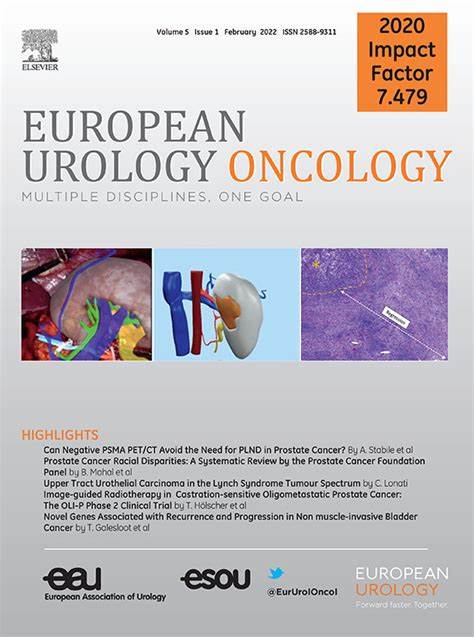低级别膀胱肿瘤的去强化治疗:国际膀胱癌小组(IBCG)合作综述》。
IF 8.3
1区 医学
Q1 ONCOLOGY
引用次数: 0
摘要
背景和目的:低级别(LG)尿路黏膜封闭型(Ta 期)非肌浸润性膀胱癌(NMIBC)的治疗是一项独特的治疗挑战。经尿道膀胱肿瘤切除术(TURBT)是标准治疗方法,但由于肿瘤复发率高,经常需要重复进行。这给患者和医疗基础设施都造成了相当大的压力,凸显了对替代治疗方法的需求。在此,IBCG(国际膀胱癌组织)进行了一项综述,以探讨针对复发性 LG Ta NMIBC 的去强化治疗策略的有效性和安全性:我们对 PubMed/MEDLINE 和 Cochrane CENTRAL 数据库中的相关文献进行了合作性综述。我们的重点是高质量的证据,包括随机对照试验、系统综述和荟萃分析。我们还查阅了著名泌尿外科协会发布的指南:积极监测、化疗消融和手术切除是治疗复发性 LG Ta NMIBC 的有效方法。与 TURBT 相比,这些非强化治疗方法具有以下优势:并发症发生率低、发病率低、医疗费用低、患者生活质量高。重要的是,这些优势是在不影响肿瘤安全性的前提下实现的:我们的综述表明,针对复发性 LG Ta NMIBC 的低强度治疗策略既可行又有价值。患者总结:我们回顾了有关低级别非侵袭性膀胱癌微创治疗方案的研究,包括主动监测、化学消融和热疗。最近的研究结果证实,这些强度较低的治疗方案可以减轻患者的治疗负担和费用,并在不对癌症控制结果产生负面影响的情况下保持患者的生活质量。本文章由计算机程序翻译,如有差异,请以英文原文为准。
Deintensification of Treatment for Low-grade Bladder Tumors: A Collaborative Review by the International Bladder Cancer Group (IBCG)
Background and objective
Management of low-grade (LG) urothelium-confined (Ta stage) non–muscle-invasive bladder cancer (NMIBC) poses a distinct therapeutic challenge. Transurethral resection of bladder tumor (TURBT), the standard treatment, frequently has to be repeated because of high tumor recurrence rates. This places a considerable strain on both patients and health care infrastructure, underscoring the need for alternative management approaches. Herein, the IBCG (International Bladder Cancer Group), conducted a review to explore the efficacy and safety of deintensified treatment strategies for recurrent LG Ta NMIBC.
Methods
We conducted a collaborative review of relevant literature in the PubMed/MEDLINE and Cochrane CENTRAL databases. Our focus was on high-quality evidence, including randomized controlled trials, systematic reviews, and meta-analyses. We also reviewed guidelines published by prominent urological associations.
Key findings and limitations
Active surveillance, chemoablation, and office fulguration are valid treatment options for recurrent LG Ta NMIBC. These deintensified approaches offer several advantages over TURBT: lower complication rates, less morbidity, lower health care costs, and better quality of life for patients. Importantly, these benefits are achieved without compromising oncological safety.
Conclusions and clinical implications
Our review demonstrates that less intensive treatment strategies for recurrent LG Ta NMIBC are both feasible and valuable. The IBCG recommends use of these approaches for carefully selected patients to help lower health care costs and enhance patients’ quality of life.
Patient summary
We reviewed studies on less invasive management options for low-grade noninvasive bladder cancer, including active surveillance, chemical ablation, and heat treatment. Recent results confirm that these less intense treatment options can reduce the treatment burden and costs for patients and preserve their quality of life without negatively affecting cancer control outcomes.
求助全文
通过发布文献求助,成功后即可免费获取论文全文。
去求助
来源期刊

European urology oncology
Multiple-
CiteScore
15.50
自引率
2.40%
发文量
128
审稿时长
20 days
期刊介绍:
Journal Name: European Urology Oncology
Affiliation: Official Journal of the European Association of Urology
Focus:
First official publication of the EAU fully devoted to the study of genitourinary malignancies
Aims to deliver high-quality research
Content:
Includes original articles, opinion piece editorials, and invited reviews
Covers clinical, basic, and translational research
Publication Frequency: Six times a year in electronic format
 求助内容:
求助内容: 应助结果提醒方式:
应助结果提醒方式:


